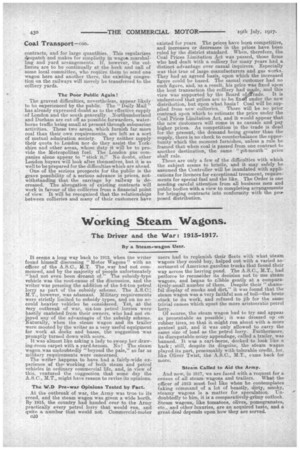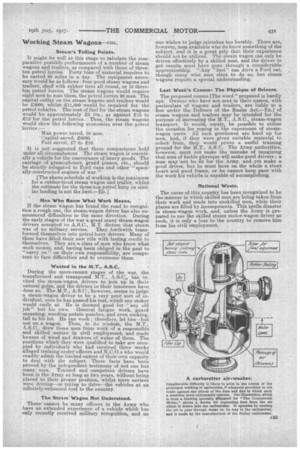Working Steam Wagons.
Page 6

Page 7

If you've noticed an error in this article please click here to report it so we can fix it.
The Driver and the War : 1915.1917.
By a Steam-wagon User.
It seems a. long way back to 1913, when the writer found himself discussing "Motor Wagons" with an officer of the A.S.C., M.T. The war had not commenced, and by the majority of people unfortunately "had not even been dreamt of. The subsidy-type vehicle was the root-cause of the discussion, and the writer was pressing the addition of the 5-6-ton petrol lorry as part of the subsidy scheme. The A.S.0:; M.T., however, was adamant. Military requirements were strictly limited to subsidy types, and on no accould heavier vehicles be considered. Yet, at the very outbreak of war, six-ton petrol lorries were hastily snatched from their owners, who had not enjoyed any of the advantages of the subsidy scheme. Naturally, when the steam wagon and its trailer were mooted by the writer as a very useful equipment for work at docks and bases, the suggestion was promptly turned down with scorn.
It was almost like asking a lady to sweep her drawing-room carpet with a yard-broom. No! The steam wagon was undoubtedly "beyond the pale," so far as military requirements were concerned.
The writer happens to have had a fairly-wide experience of the, working of both steam and petrol vehicles in ordinary commercial life, and, in view of this, ventured the euggestion that some day the A.S.C., M.T., might have reason to revise its opinions.
The W.D Pre-war Opinions Tested by Fact.
At the outbreak of war, the Army was true to its creed, and the steam wagon was given a wide berth. By 1915, the country had handed over to the Army practically every petrol lorry that would run, and quite a number that would not. Commercial-motor 030 users had to replenish their fleets with what .steam wagons they could buy, helped out with a varied assortment of American gasoline trucks that found their way across the herring pond. The A.S.C., M.T.' had perforce to reconsider its decision not to use steam wagons, and began to nibble gently at a comparatively-small number of them. Despite their " shameful display of smoke and dirt," it was found that the steam wagon was a very faithful son of toil—the brute stuck to its work, and refused to jib for the same trivial causes which upset the more aristocratic petrol lorry. Of course, the steam wagon had to try and appeal as presentable as possible'; it was dressed up on rubber tires so that it might run about with a-more genteel gait, and it was only allowed to carry the same size of load as the petrol lorry. Furthermore; its disreputable-noisy appendage, called a. trailer, was banned. It was a cart-horse, docked to look like a hack ; still, despite its disguise, the steam wagon played its part, presumably with tolerable credit, far, like Oliver Twist, the A.S.C., M.T., came back for more.
Steam Called to Aid the Army.
And now, in 1917, we are faced with a request for a census of all steam .wagons and trailers. What the officer of 1913 must feel like when he contemplates taking command of a lot of beastly, dirty, smoky, steamy wagons is a matter for speculation. Undoubtedly to him, it is a comparatively-grimy outlook. Steam wagons, like tomatoes, olives, pomegranates, etc., and other luxuries, are an acquired taste, and a great deal depends upon how they are served. Steam's Telling Points.
It might be well at this stage to tabulate the com parative possible performances of a number of steam wagons and trailers, as compared with those of threeton petrol lorries Forty tons of material requires to be carted 80 miles in a day. The equipment necessary would be as follows : four good steam wagons and trailers, shod with rubber tires all round, or 13 threetoe petrol lorries. The steam wagons would require eight men to man them the petrol lorries 26 men. The capital outlay on the steam wagons and trailers would be 23000, whilst-211,000 would be required for the petrol vehicles. The cost of fuel for the steam wagons would be approximately 23 10s., as against 210 to 213 for the petrol lorries. Thus, the steam wagons would show the following economies over the petrol lorries :— Man power saved, 18 men.
Capital saved, 28000.
Fuel saved, 27 to 210.
It is not -suggested that these comparisons hold inder all circumstances. The steam wagon is essenti ally a vehicle for the conveyance of heavy goods. The carriage of gramophones, grand pianos, etc., should be strictly relegated to Ford vans and other "specially-constructed engines of war."
[The above schedule of working is the maximum , for a rubber-tired steam wagon and trailer, whilst the estimate for the three-ton petrol lorry on similar loading is not the best—ED.] Men Who Know What Work Means.
If the steam wagon has found the road to recognition a rough one, the steam-wagon driver has also encountered difficulties in the same direction. During the early stages of the war a great many steam-wagon drivers accepted to A.S.C., M.T. dictum that steam was of no military service. They, forthwith transformed themselves into petrol-lorry drivers. Many of them have filled their new role with lasting credit to themselves. They are a class of men who know what work means, and, having been obliged in the past to " carry on" on their own responsibility, are competent to face difficulties and to overcome them.
Wasted in the ALT., A.S.C.
During the more-recent stages of the war, the transformed and transposed M.T., A.S.C., has invited the steam-wagon drivers to join up in their natural guise, and the drivers in their innocence have done so. The M.T., A.S.C., however, seems to judge a steam-wagon driver to be a very poor sort of individual, once he has .passed his test, which any stoker would smile at. He is deemed good for " any old sob" but his own. General fatigue work, guard mounting, weeding potato patches, And even cooking, fall to his lot. He can work ; therefore, let him—but not on a wagon. Thus, in its wisdom, the M.T., A.S.C., dew these men from wOrk of a responsible and skilled nature in civil employment, and made hewers of wood and drawers of water of them. The positions which they were qualified to take are occupied by individuals who had received three weeks alleged training under officers and N.C.0..s who would readily admit the limited extent of their own capacity to deal with the subject. These facts have been proved by the independent testimony of not one but many men. Trained and competent drivers have been in the Army as long as two years, without being placed to their proper position, whilst mere novices were driving—or trying to drive—the vehicles at an infinitely-enhanced cost to the country.
The Steam'Wagon Not Understood.
There' cannot be many officers in the Army who have an extended experience of a vehicle which has only recently received military recognition, and no one wishes to judge mistakes too harshly. There are, however, men available who do know something of the subject, and it is a great pity that their experience should not be utilized. The steam wagon can only be driven effectively by a skilled man, and the driver to get results must have gone through a considerable apprenticeship. " Any " fool " can drive a Ford car, though many wise men elect to do so, but steam wagons require, a, special understanding.
Last Week's Census! The Physique of Drivers.
The proposed census [The word " proposed is hardly apt. Owners who have not sent in their names, with particulars of wagons and trailers, are liable to a fine under the Defence of the Realm Act.—En.] of steam wagons and trailers may be intended for the purpose of increasing the M.T., A.S.C., steam-wagon transport. -It would, surely., be possible to utilize the occasion for roping in the experience of steamwagon users. All such gentlemen are hard up for men, 'and, if they were given suitable material to select from, they would prove a, useful training ground for the M.T., A.S.C. The Army authorities, however, must not make the mistake of imagining that men of feeble physique will make good drivers ; a man may mot be fit for the Army, and yet make a, good driver, but he must have on the whole a stout heart and good frame, or he cannot keep pace with the work his vehicle is capable of accomplishing.
National Waste.
The curse of this country has been recognized to be the manner in which skilled men are being taken from their work and made into unskilled men, while their places are filled by incompetents. This spells disaster in steam-wagon work, and, unless the Army is prepared to use the skilled steam motor-wagon driver as such, it is only a loss to the country to remove him from his civil employment.




















